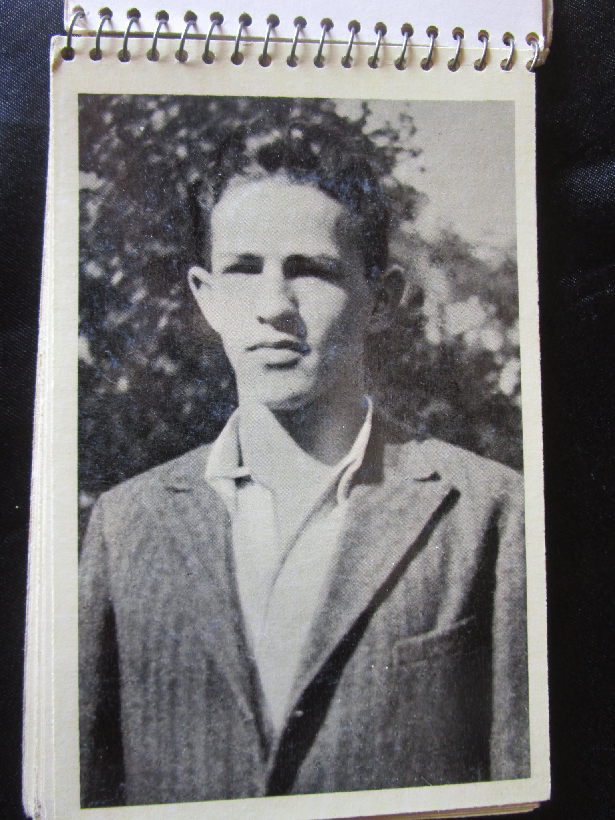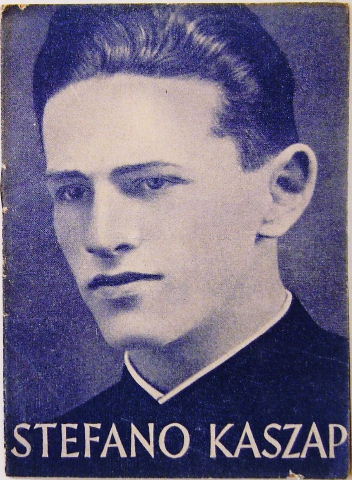Servant of God - Stephen Kaszap, SJ
Born: March 25, 1916
Died: December 17, 1935
 Stephen Kaszap was a Jesuit novice when he died, three months short of his twentieth birthday. He bore his sufferings like a young hero. He was born in Szekesfehervar, Hungary.
Stephen Kaszap was a Jesuit novice when he died, three months short of his twentieth birthday. He bore his sufferings like a young hero. He was born in Szekesfehervar, Hungary.
His mother described him as a stubborn child, quick tempered and always insisting on his
own way. He went to school only after his parents had threatened him with the police. After
spending four years in an elementary school he went on to St Stephen’s, an institution run
by the Cistercians. His scholastic performance was erratic during his early days but things changed when he entered his teens. Stephen was able to control his temper, became serious-minded and his studies improved and he was among the top students during his final years. During these years he kept a journal, jotting down not only ordinary events but also his growth in his spiritual life. Passages from this journal reveal a spiritual maturity rare in one so young. On his success in studies he wrote: “My work is directed by the word of God; the faithful accomplishment of my duty.”
At fifteenth, Stephen joined the sodality and began attending daily Mass at the church
adjacent to the school. He was an all-rounder. Beside his studies, he was a scout and enjoyed
camping out; was an athlete and an exceptional gymnast and was placed fourth in a national gymnastic competition for secondary schools held in Budapest. In March 17, 1934 he became the champion of Western Hungary when he won all the prizes. But he looked upon his success with uncommon modesty and humility. In his journal dated April 19, 1934, he asked himself: “What will make a man happy?” In his answer he rejects wealth, glory, and pleasure, and adds: “Interior joy is a tender and delicate flower which withers in hearts that are
maddened by money, poisoned by honours and hardened by pleasure. It blooms in all its
beauty in noble souls that know but a single end, the loftiest, the holiest, ‘Eternal God’.”
Stephen had always wanted to be a priest but had not thought about which order to enter.
In the Spring of 1934, he read Bishop Ottokar Prohaszka’s Ways and Stations, the Bishop of
Szekesfehervar who died in 1927. In one of its chapters, the Bishop reflects on his happy
days at the German-Hungarian College in Rome and in his studies with the Jesuits. Stephen
felt that the Jesuit life would suit him. So in July 30, 1934, at the age of eighteen, a robust
and handsome looking Stephen entered the novitiate outside Budapest, not realizing that
a good part of his novitiate days were to be days of suffering due to a disease that slowly
undermined his strength. He now had to call upon the courage, discipline, and self-control
he had acquired in becoming a champion gymnast, to suffer with joy and resignation.
Just before Christmas 1934, Stephen’s ankles became swollen, his joints ached, and he could
hardly walk. Soon ulcers appeared on his fingers, neck and face and his tonsils became
inflamed and he became feverish. His journal tells us his inner feelings: “The cross that God
gives is to be borne willingly and cheerfully. A little sickness does much more for us than ten
or twenty years of health.” Stephen recovered but in January of 1935 the ulcers reappeared
and the fever returned, followed by nosebleeds and a large ulcerous patch appeared on his
left thigh. Fearing it could be erysipelas, a brother infirmarian called for the physician who
lanced it but it continued to increase in size and Stephen was anointed and taken to hospital where he was operated upon. He recovered somewhat and returned to the novitiate but his
tonsils again caused him distress and the ulcers reappeared. Amid his pain he had the
calmness of soul to pen on March 18, 1935: “Most Sacred Heart of Jesus, grant that I may
renounce myself more and more; I wish to keep nothing for myself, neither my prayers nor
my pains.”
 On the advice of the physician that his native air might do him good, Stephen returned
On the advice of the physician that his native air might do him good, Stephen returned
home to be with his family on November 3, 1935. On the 8th, the fever returned and the
ulcers covered his body and he was taken to hospital where the doctors confirmed he had
erysipelas. After two weeks quarantine, Stephen was discharged. As he appeared to have
recovered, the physician recommended that he had his tonsils removed on December 4. He
returned to his parents’ home on December 14 and that same night the fever attack
returned. He was hospitalized as the physician suspected he had a tumour in his throat.
Stephen was unable to talk nor eat as the tumour was strangling him. All night long Stephen
fought against suffocation and though tears flowed from his eyes, he kept them fixed on the crucifix in his hand. Then finally on 17th, the surgeon made an opening in his larynx and inserted a tube to ease his breathing.
When Stephen revived he wrote on the bed cover “I want a priest.” The sister caring for him
judged that he was no longer in danger of death and did not heed his request. At 5.00 a.m.
when the nurses changed shift, Stephen wrote to the new sister on duty: “ I am unable to go
to confession. I only want absolution as I cannot have Communion, because I cannot
swallow. I want Extreme Unction.” The sister immediately went to get the priest next door
but by the time he arrived Stephen had already lost consciousness. The priest absolved and
anointed him and remained with him until he heard Stephen’s final gasp. It was 6.10a.m.,
December 17, 1935. In his hands Stephen clasped his crucifix and a medal of Our Lady.
After Stephen’s death, they found a note containing his final words, presumably written
shortly by Stephen before he became unconscious. It was for his parents: “ Good-bye. We
shall meet again on high. Do not weep. It is my birthday in heaven. God bless you.”
Stephen’s heroic acceptance of the Divine Will and his suffering was never forgotten. The
people brought their petitions to Stephen for his intercession because they were convinced
that he was living with God. Many of these petitions were answered, so the diocese, within
six years of Stephen’s death, initiated the canonical process investigating his life and virtues.
